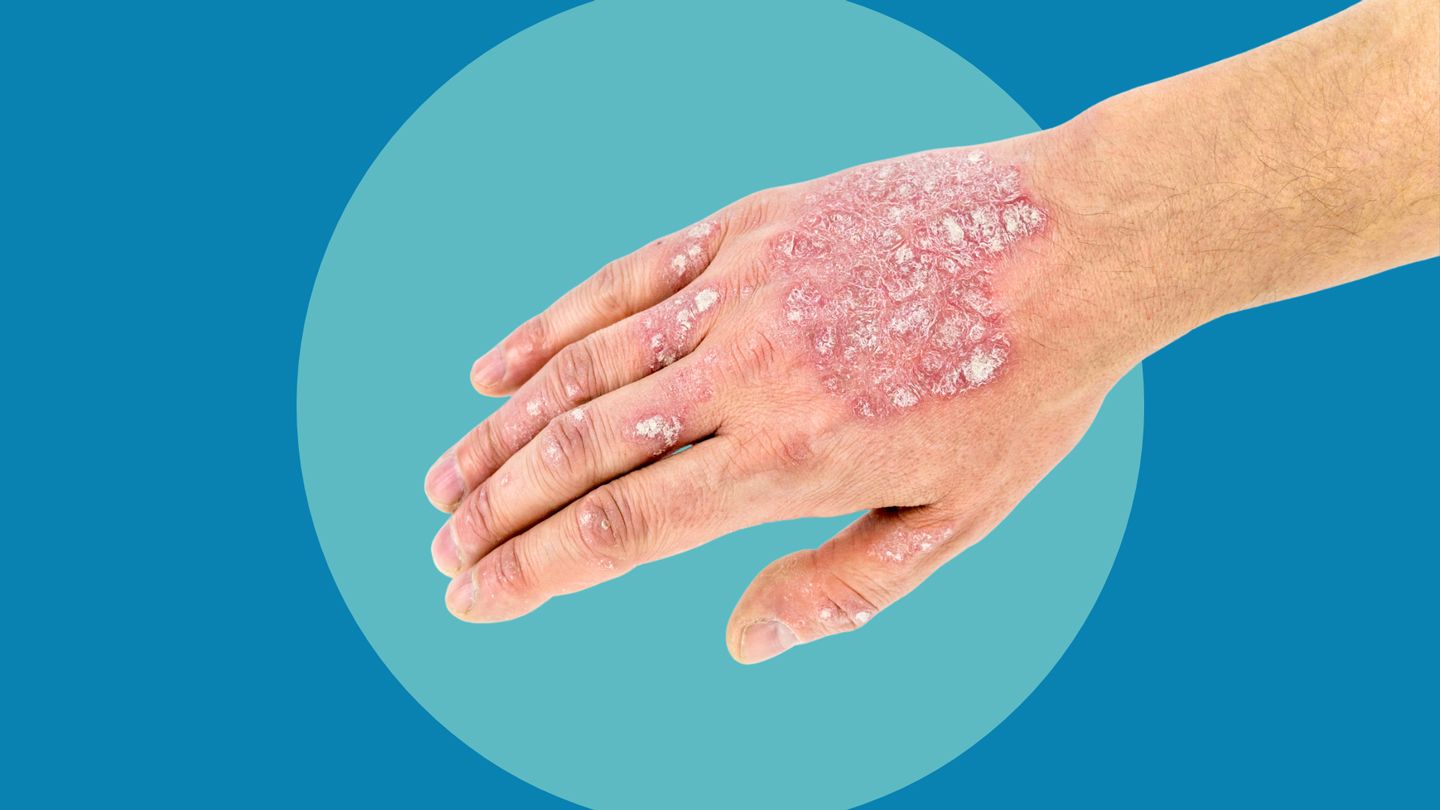Psoriasis and rheumatoid arthritis are both autoimmune diseases. While they affect your body in different ways, they share some common elements. And some research suggests that having one of these conditions may increase a person’s risk of developing the other.e60dc2a1-f33c-4a05-9b50-8e3e8e597629abbe0b2e-2ad7-49c6-bec1-0747a3088aaa Here’s a closer look at the possible link between psoriasis and rheumatoid arthritis.
Shared Features of Psoriasis and RA Shared Features Like other autoimmune diseases, both psoriasis and rheumatoid arthritis (RA) happen because of a fault with the immune system that causes it to attack healthy tissues. The exact cause of this is not fully understood for either disease. This abnormal immune response results in chronic inflammation. It mainly affects your skin if you have psoriasis, and your joints and other areas if you have rheumatoid arthritis. Symptoms of both conditions also tend to come and go in cycles. You may have periods where symptoms get worse, called flares. These are often in response to certain triggers, such as smoking or infection. Because they share similar mechanisms, some of the same treatments work for both conditions. There are, however, treatments for psoriasis and psoriatic arthritis that do not work in rheumatoid arthritis.e60dc2a1-f33c-4a05-9b50-8e3e8e59762921dad0d3-29a8-4403-b49d-0180f5d50898e60dc2a1-f33c-4a05-9b50-8e3e8e597629e408c168-d8f9-4f41-933f-ec4b09526b89
Can You Have Both Psoriasis and RA? Can You Have Both Psoriasis and RA? Psoriasis is more commonly associated with psoriatic arthritis , but it’s also possible for someone with psoriasis to have RA. David Chetrit, MD , a rheumatologist at Carolina Health Specialists in Myrtle Beach, South Carolina, says, “Although there is no direct link between psoriasis and RA, individuals with one autoimmune disease often have a higher risk of developing another, due to shared underlying genetic and environmental factors.” Additionally, some medications used to treat rheumatoid arthritis may increase your chances of developing psoriasis. While it isn’t common, some people taking immunosuppressant drugs called tumor necrosis factor (TNF) inhibitors for RA have reported either new or worsening psoriasis.e60dc2a1-f33c-4a05-9b50-8e3e8e597629dadc6bb9-82b7-4746-9877-f8af62c7d523 The drugs plaquenil or hydroxychloroquine for RA can also cause or aggravate psoriasis. Does Having Psoriasis and RA Mean You Have Psoriatic Arthritis? No. The two types of arthritis are different diseases. There’s a stronger relationship between psoriasis and psoriatic arthritis. It’s estimated that between 20 and 30 percent of people with psoriasis also have psoriatic arthritis.e60dc2a1-f33c-4a05-9b50-8e3e8e5976294a202ad5-0d66-48e5-a5af-401f4d06004c By contrast, an analysis of U.S. health data showed that fewer than 10 percent of people with psoriasis also had rheumatoid arthritis.e60dc2a1-f33c-4a05-9b50-8e3e8e5976296b2ab9c0-55c5-4a04-8059-0b3576a299a8
Psoriatic Arthritis vs. Rheumatoid Arthritis: Which Do You Have? Which Do You Have? One way to determine what form of arthritis you have is to examine your symptoms. Rheumatoid and psoriatic arthritis have some symptoms in common, such as joint pain, stiffness, and swelling. But rheumatoid arthritis joint symptoms are usually symmetrical, whereas psoriatic arthritis is more likely to affect a joint on just one side. The two types of arthritis also tend to affect different joints. Psoriatic arthritis symptoms often also include a skin rash, nail damage, and eye inflammation.e60dc2a1-f33c-4a05-9b50-8e3e8e597629cb463823-d432-4f97-8681-863815da3771 Your doctor will also ask if you have a family history of either form of arthritis. They may also order blood and imaging tests. People with rheumatoid arthritis usually have certain antibodies in their blood. The diagnosis can be something of a gray area when psoriasis is involved. Says Dr. Chetrit, “Because these conditions share similar symptoms, such as joint pain, swelling, and stiffness, some patients initially receive a diagnosis of RA before later being reclassified as having PsA if skin symptoms emerge.” Neither condition is necessarily worse than the other. Both can cause problems in your body beyond your joints and put you at higher risk for cardiovascular problems. Neither type of arthritis has a cure, and they both need to be managed long-term.e60dc2a1-f33c-4a05-9b50-8e3e8e597629ae722a8b-f7e9-47ed-b91e-fb7371eea1c6
Treatment of Psoriasis and RA Treatment There is some overlap in the treatments used for psoriasis and rheumatoid arthritis. Because these diseases involve dysfunction in your immune system, both may respond to drugs that lower your immune activity or reduce inflammation. “Many treatments are effective in both conditions including methotrexate and biologic medications such as anti-TNF medications (adalimumab, etanercept, certolizumab, infliximab),” says Kimberly Trotter, MD , with the University of Chicago Medicine. Corticosteroids, either oral or injected, are another type of anti-inflammatory drug that can treat both psoriasis and rheumatoid arthritis. While these systemic drugs are commonly used with RA, with psoriasis they’re usually reserved for cases of severe disease that hasn’t responded to other treatment.e60dc2a1-f33c-4a05-9b50-8e3e8e59762961ef2fa7-3ff3-4b99-9673-6b90d51bb31ce60dc2a1-f33c-4a05-9b50-8e3e8e59762923c5b31d-d1a8-4dec-a707-05d399a79340 Other treatments for psoriasis include: Topical medications, including corticosteroids, synthetic vitamin D, coal tar, and salicylic acid Light therapy Retinoids, which are pills or creams derived from vitamin A Cyclosporine, another oral immunosuppressor Other treatments for rheumatoid arthritis include: Nonsteroidal anti-inflammatory drugs (NSAIDs) Other immunosuppressors, including hydroxychloroquine and sulfasalazine Other biologics, including abatacept, anakinra, and rituximab Physical therapy to improve flexibility Surgery to repair damaged joints
When to See a Rheumatologist When to See a Rheumatologist If you have psoriasis, you should speak to a rheumatologist if you experience any new or worsening joint pain, or pain that keeps you from doing your usual activities.e60dc2a1-f33c-4a05-9b50-8e3e8e5976299dc1be0c-9238-46ff-9856-b2147dcb1d22 Having both psoriasis and rheumatoid arthritis could make you more likely to have physical and emotional complications, including a higher risk of serious heart and blood vessel problems. That’s why it’s important to find an effective treatment as soon as possible.e60dc2a1-f33c-4a05-9b50-8e3e8e597629cb9f3a14-e063-46c8-ac31-4c2cf611ec73
The Takeaway Psoriasis and rheumatoid arthritis are both autoimmune conditions, and it’s possible to have both at once. It’s more common to have psoriatic arthritis along with psoriasis. Psoriatic arthritis and rheumatoid arthritis can be distinguished by the pattern of their symptoms and the presence or absence of certain blood markers. Speak with your doctor if you have psoriasis and notice any new or worsening joint pain, or pain that gets in the way of daily life. There are certain treatments that can help control both psoriasis and rheumatoid arthritis.
Resources We Trust Mayo Clinic: Psoriasis Cleveland Clinic: Rheumatoid Arthritis National Institutes of Health: Autoimmune Diseases American Academy of Dermatology Association: Psoriasis: Causes Arthritis Foundation: Understanding Rheumatoid Arthritis Flares
Read the full article here
Leave a comment




